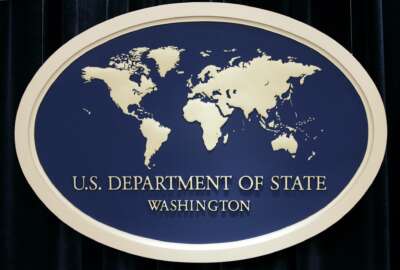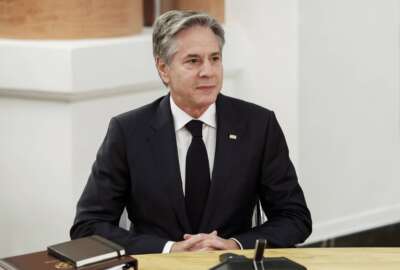How the State Department fills an ongoing need for information technology talent
The State Department recently chose 15 college students for this year's round of Foreign Affairs Information Technology fellowships.
The State Department recently chose 15 college students for this year’s round of Foreign Affairs Information Technology fellowships. Winners get academic funding, internships, and eventually a State Department posting. Joining the Federal Drive with Tom Temin is one of the 2024 cohort, Astrid Tagne from the University of Maryland. But first, for some background on the fellowship program, Orienta Huger, a State Department IT recruiter.
Interview Transcript:
Tom Temin And let’s begin with the background. Tell us more about the F A I T the FAIT program. This is an annual thing and what are the objectives of it?
Orienta Huger Sure. So, the Foreign Affairs IT fellowship, it’s been around since 2017. And it’s a merit and needs based program, and it’s designed to attract outstanding students and professionals to prepare them for a career. To apply their technology, technology skills, in support of business of diplomacy. They will become a diplomatic Technology Officer with the Department of State we offer undergraduate and graduate students this opportunity to be eligible for this scholarship, you need to be a US citizen and you need to be enrolled or planning to enroll in a full time IT related degree program at a US based accredited institution. The timeline for the scholarship as an undergraduate need to apply in your sophomore year, graduate students need to be seeking admission to a full time it related master’s degree program. And another requirement is you need to have a minimum 3.2 GPA on four-point scale at the time of your application. At the end of this fellowship program. Students they have a five-year service commitment to be in the Foreign Service to serve abroad. That is the service commitment that they make in the fellowship throughout the fellowship. What it provides is up to for $43,500 annually for two years to fund tuition, room and board books and other fees, travel expenses. Students also receive stipends for housing and travel allowances. There’s one domestic internship and one overseas domestic internship and they also get personalized mentoring and professional development opportunities.
Tom Temin Okay, and when they are overseas, what do they typically do, you know, the CIO function at the State Department is somewhat centralized. But you have, you know, a couple of 100 installations around the world is diplomacy knowledge, part of this, in addition to what they need to know about information technology, and programming and applications and cloud computing.
Orienta Huger Yeah, so you know, the main job is to, you know, work in IT. What they will be doing overseas is, they will have a job as the position is called a diplomatic Technology Officer. So, what that means we’re in charge of all of the IT operations overseas at a US Embassy, or consulate. So that can be IT project management, data analytics, system administration, network administration, those types of things. Those are the general core functions of the job. So even though you’re not necessarily directly, you know, doing diplomacy, maybe you know, talking to the Ministry of a foreign government, but you support all of the diplomacy of all your colleagues on work that they’re doing abroad. So, you do need to have a general knowledge of diplomacy, how to conduct yourself, because you’re a representative of the United States Government overseas. All right, Orienta Huge, is an IT recruiter at the State Department. Let’s turn to Astrid Tagne, one of the students and a member of this year’s cohort. Astrid, tell us about yourself. You are a first generation American, where do you hail from originally? And what are your hopes here?
Astrid Tagne I am originally from Cameroon. I came here at the end of 2014, meaning I was going to 5th grade, but I only did two, two months in fifth grade. And so, coming from Cameroon, like I could not speak English. So, I had to like learn English during my career. Like now I’m here. But honestly, something that I really hope to do with this program is long term. I want to work on diplomacy, because one of the things that stood out to me when I was applying and something I really touched on during my interview process with the FAIT fellow was the fact that I want to see how technology is implemented in other countries. And there’s no better way for me to do that than to be a DTO for the federal government.
Tom Temin Yes, in fact, working overseas, a lot of the staff that might be in IT and other diplomatic functions are in fact, local nationals from the country where the State Department is so there’s a chance to interact with all sorts of people. I imagine that appeals to you.
Astrid Tagne That really does appeal to me. Another thing I’m really big on like coming from a cultural background growing up among cultural people is like maintaining a cultural background. But I also have a thing for connecting with people. Like I love connecting people. And one of the things that definitely stood out to me for this program was the fact that I get to go abroad. I get to interact with different cultures. And I think that’s something that money cannot pay is the experience of learning other people’s culture and taking that back with you. And also teaching them something about another culture. I think that’s really beautiful.
Tom Temin And your English is pretty darn good for someone that didn’t have it at birth, I understand you speak several other languages pretty well, too.
Astrid Tagne Yes, I speak French and I speak Spanish too.
Tom Temin Sounds like you can pick up anything. So, who knows where they will post you it could be someplace with you know, a non-Latin-based alphabet, and then you’ll have another challenge in front of you.
Astrid Tagne I love challenges. That’s perfect.
Tom Temin And you’ve got a lot of other interests looking at some of what they say about you weightlifting and sewing, right.
Astrid Tagne So, I started doing weightlifting, my junior year of high school was like right off the COVID. And I had a friend, I was really into weightlifting. And I just I started weightlifting club at my high school, like a weightlifting Club for Girls. And then it’s still something that I do, it’s just once again, it’s a way of connecting people. I think that like when you go places, if you have an interest, that’s a great way to meet people. And so, for me, like as a natural connector, I always have hobbies, because my hobbies allow for me to meet people and connect with people. And it also adds to me into like, I mean, who I am as a person. And so weightlifting is just something that has kind of like, I mean, helped me to maintain the community in that specific aspect. And then I also have a huge interest in sewing and like, I don’t know how the two connect, but the connection for me is just people. And so that’s how I’ve been able to kind of maintain who I am as a person, and also the people that come into my circle and vice versa.
Tom Temin And with respect to information technology, any particular area that you’re most interested in.
Astrid Tagne I mean, what I will say is when it comes to information technology, which at first, I want to talk about how I got into information technology. So, I got into information technology in summer of 2021. I had never I’d taken a computer science class in high school. But outside of that I had never had an interest in technology. So, it was like the last thing on my list of what I was going to go to do in high school. At the time, I wanted to be a doctor or a nurse or something like that. But like data are so quick. And through this forum called passion for learning, which is a nonprofit organization, I was able to get a scholarship that funded me going to like a one-week camp called Tech Squad with MS gene. And for that program, I was able to learn technology, we coded in C++, we made mini robots, we built a car. And then I was like, I want to do this full career. And like after that, I did more research on what it means to like, go into technology as a field. And I was like, okay, this is definitely something I want to do. But I had to find like a VR to relate it back to me. And so, I thought about the time when I first came to America, and lights didn’t go out, like in Cameroon, lights go out every night. Like we never slept in actual light. We had to use like oil lamps to like use as a light source. And then the first time I went to school, it was like a month that I came here. Every student had a Chrome book assigned to them. And I felt like I had never used a computer like in my lives. I found out so shocking. The fact that students are able to have like a Chrome book to the name, of course, they couldn’t take it home. But like they still had the opportunity to use it in school when back in Cameroon, we only had one computer for like the entire school. Sure. So, after that, like that was my direct relation relating technology to me was that, okay, going into the future, I want to implement technology, I want to bridge the gap that technology has in other undeveloped countries. And that’s kind of what has kept me going now. It’s like, as I’m going to stores, I want to see the way that other cultures implement technology, because I know the way Americans implement technology works for us here. And that’s why I’m going to be going back to these countries and putting back because it works for us, and I want it to work for other people too. So that’s the long-term goal.
Tom Temin All right. Well, somehow I think the State Department is going to get a good return on its investment in you. Astrid Tagne is a student at the University of Maryland and a recipient of a Foreign affairs Information Technology fellowship. Thanks for being with us.
Astrid Tagne Thank you.
Tom Temin And we also heard from Orienta Huge. She’s an IT recruiter at the State Department. good having you with us.
Copyright © 2024 Federal News Network. All rights reserved. This website is not intended for users located within the European Economic Area.
Tom Temin is host of the Federal Drive and has been providing insight on federal technology and management issues for more than 30 years.
Follow @tteminWFED





